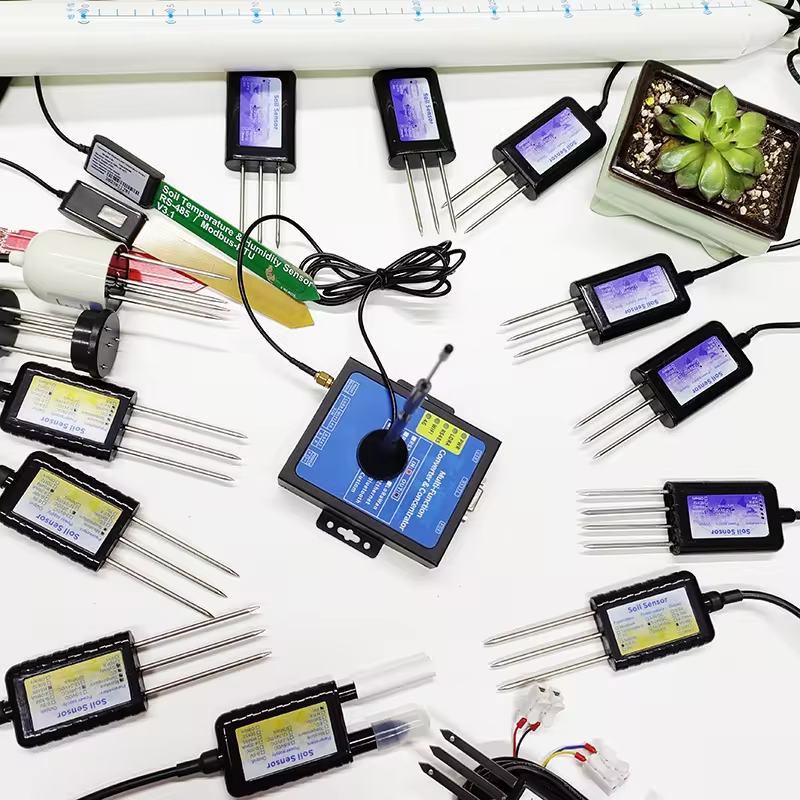1. فصل کی پیداوار کو بہتر بنائیں
انڈونیشیا میں بہت سے کسان مٹی کے سینسر لگا کر پانی کے وسائل کے استعمال کو بہتر بناتے ہیں۔ کچھ معاملات میں، کسان مٹی کی نمی کی نگرانی کے لیے سینسر کا استعمال کرتے ہیں اور یہ معلوم کرتے ہیں کہ مختلف موسمی حالات کے مطابق آبپاشی کی حکمت عملیوں کو کیسے ایڈجسٹ کیا جائے۔ مثال کے طور پر، کچھ بنجر علاقوں میں، سینسر استعمال کرنے کے بعد، آبپاشی کی کارکردگی میں بہتری آئی ہے اور فصل کی پیداوار میں بھی نمایاں اضافہ ہوا ہے۔ یہ مشق نہ صرف پانی کے وسائل کے استعمال کی کارکردگی کو بہتر بناتی ہے بلکہ پانی کی کمی کی وجہ سے فصلوں کے نقصان کو بھی کم کرتی ہے۔
2. پیداواری لاگت کو کم کریں۔
رپورٹ میں نشاندہی کی گئی ہے کہ انڈونیشیا کے کسان مٹی کے سینسر کی مدد سے کھاد کو زیادہ درست طریقے سے لگا سکتے ہیں، اس طرح استعمال شدہ کھاد کی مقدار کو مؤثر طریقے سے کم کیا جا سکتا ہے۔ کچھ جگہوں پر سروے کے مطابق، سینسرز کے استعمال کے بعد، کسانوں کی کھاد کی لاگت میں اوسطاً 20% سے 30% تک کمی آئی ہے۔ کھاد ڈالنے کا یہ درست طریقہ کسانوں کو لاگت بچانے کے ساتھ فصل کی پیداوار کو برقرار رکھنے یا بڑھانے میں مدد کرتا ہے۔
3. تکنیکی تربیت اور فروغ
انڈونیشیا میں وزارت زراعت اور غیر سرکاری تنظیمیں (این جی اوز) مٹی کے سینسر کے استعمال کو فروغ دینے اور کسانوں کو تربیت فراہم کرنے کے لیے سرگرم عمل ہیں۔ یہ منصوبے نہ صرف کسانوں کو یہ سکھاتے ہیں کہ کس طرح سینسرز کا استعمال کرنا ہے، بلکہ ڈیٹا کے تجزیہ میں معاونت بھی فراہم کرتے ہیں، جس سے وہ حقیقی وقت کے تاثرات کی بنیاد پر سائنسی فیصلے کرنے کے قابل ہوتے ہیں۔ اس طرح کی تربیت نے چھوٹے کسانوں میں مٹی کے سینسر کے استعمال کو بہت فروغ دیا ہے۔
4. پائیدار زرعی طریقوں
مٹی کے سینسر کی مقبولیت کے ساتھ، زیادہ سے زیادہ انڈونیشی کسان پائیدار زرعی طریقوں کو اپنانے لگے ہیں۔ یہ سینسر کسانوں کو مٹی کی صحت کو سمجھنے میں مدد دیتے ہیں، تاکہ وہ فصلوں کو بہتر طریقے سے گھما سکیں اور نامیاتی کھادوں کا استعمال کر سکیں۔ اس طرح انڈونیشیا کی زرعی پیداوار زیادہ ماحول دوست اور پائیدار سمت کی طرف بڑھ رہی ہے۔
5. مخصوص معاملات
مثال کے طور پر، مغربی انڈونیشیا میں چاول کے کچھ کھیتوں میں، کچھ کسانوں نے ٹکنالوجی کمپنیوں کے ساتھ مل کر مٹی کے خود کار طریقے سے سینسر سسٹم نصب کیا ہے۔ یہ نظام نہ صرف حقیقی وقت میں زمین کی حالت کی نگرانی کر سکتے ہیں بلکہ موبائل فون ایپلی کیشنز کے ذریعے کسانوں کو انتباہات بھی بھیج سکتے ہیں تاکہ انہیں یاد دلایا جا سکے کہ انہیں آبپاشی یا کھاد کی ضرورت کب ہے۔ اس ہائی ٹیک ذرائع کے ذریعے، کسان اپنے کھیتوں کا زیادہ مؤثر طریقے سے انتظام کر سکتے ہیں۔
انڈونیشیا کے کسانوں کا مٹی کے سینسر استعمال کرنے کا رجحان ظاہر کرتا ہے کہ روایتی زراعت اور جدید ٹیکنالوجی کا امتزاج زرعی پیداوار کے لیے نئے مواقع لا رہا ہے۔ اس ٹیکنالوجی کے ذریعے کسان نہ صرف فصلوں کی پیداوار میں اضافہ کر سکتے ہیں اور لاگت کو کم کر سکتے ہیں بلکہ زیادہ پائیدار زرعی پیداوار کا طریقہ بھی حاصل کر سکتے ہیں۔ مستقبل میں، ٹیکنالوجی کی ترقی اور حکومت کے تعاون سے، انڈونیشیا میں مٹی کے سینسر کی مقبولیت سے زرعی جدیدیت کو مزید فروغ دینے کی امید ہے۔
مٹی کے سینسر کی مزید معلومات کے لیے،
برائے مہربانی Honde Technology Co., LTD سے رابطہ کریں۔
Email: info@hondetech.com
کمپنی کی ویب سائٹ:www.hondetechco.com
پوسٹ ٹائم: نومبر-22-2024


